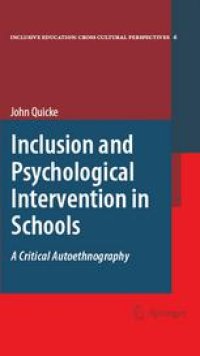
Ebook: Inclusion and Psychological Intervention in Schools: A Critical Autoethnography
Author: John Quicke (auth.)
- Tags: Learning & Instruction, Educational Policy and Politics, Methodology of the Social Sciences
- Series: Inclusive Education: Cross Cultural Perspectives 6
- Year: 2008
- Publisher: Springer Netherlands
- Edition: 1
- Language: English
- pdf
This book consists of a number of case studies about interventions in schools to promote the inclusion of pupils referred to a local authority Educational Psychology Service (EPS) in the north of England. The aim is to provide accounts which do not shirk from describing ‘failures’ as well as ‘successes’ and which reflect the general ‘messiness’ of this kind of work. They are written as ‘stories’ from the point of view of an educational psychologist who regards himself as a critical reflective practitioner whose professional practice is grounded in a democratic, inclusive philosophy. The methodology of the book draws on the qualitative research tradition in social science and education, in particular ethnography and action research, and makes a unique contribution to the role of ‘storying’ in this kind of research. The author feels that his approach represents a challenge to conventional constraints on research in his own profession which prevent the development of a more open dialogue about the role and purpose of psychological interventions to promote inclusion. The worked examples of practical strategies in mainstream provide insights which should be of interest to all support professionals, teachers, educationalists and others concerned with inclusion of pupils described as having ‘special educational needs’.
This book consists of a number of case studies about interventions in schools to promote the inclusion of pupils referred to a local authority Educational Psychology Service (EPS) in the north of England. The aim is to provide accounts which do not shirk from describing ‘failures’ as well as ‘successes’ and which reflect the general ‘messiness’ of this kind of work. They are written as ‘stories’ from the point of view of an educational psychologist who regards himself as a critical reflective practitioner whose professional practice is grounded in a democratic, inclusive philosophy. The methodology of the book draws on the qualitative research tradition in social science and education, in particular ethnography and action research, and makes a unique contribution to the role of ‘storying’ in this kind of research. The author feels that his approach represents a challenge to conventional constraints on research in his own profession which prevent the development of a more open dialogue about the role and purpose of psychological interventions to promote inclusion. The worked examples of practical strategies in mainstream provide insights which should be of interest to all support professionals, teachers, educationalists and others concerned with inclusion of pupils described as having ‘special educational needs’.